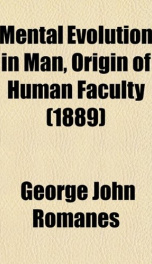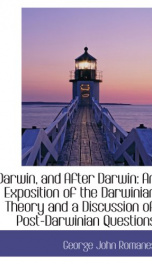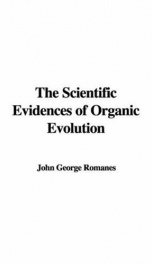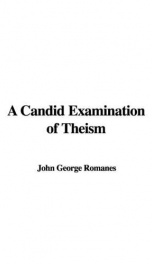Romanes George John

George John Romanes FRS (19 May 1848 – 23 May 1894) was a Canadian-born English evolutionary biologist and physiologist who laid the foundation of what he called comparative psychology, postulating a similarity of cognitive processes and mechanisms between humans and animals. He was the youngest of Charles Darwin's academic friends, and his views on evolution are historically important. He invented the term neo-Darwinism, which is still often used today to indicate an updated form of Darwinism. Romanes' early death was a loss to the cause of evolutionary biology in Britain. Within six years Mendel's work was rediscovered, and a whole new agenda opened up for debate. Romanes was born in Kingston, Ontario, the third son of George Romanes, a Scottish Presbyterian minister. When he was two years old, his parents returned to England, and he spent the rest of his life in England. Like many English naturalists, he nearly studied divinity, but instead opted to study medicine and physiology at Cambridge University. Although he came from an educated home, his school education was erratic. He entered university half-educated and with little knowledge of the ways of the world.[1] He graduated from Gonville and Caius College, Cambridge with the degree of BA in 1871,[2] and is commemorated there by a stained glass window in the chapel. It was at Cambridge that he came first to the attention of Charles Darwin: "How glad I am that you are so young!" said Darwin. The two remained friends for life. Guided by Michael Foster, Romanes continued to work on the physiology of invertebrates at University College London under William Sharpey and Burdon-Sanderson. In 1879, at 31, Romanes was elected a Fellow of the Royal Society on the basis of his work on the nervous systems of medusae. However, Romanes' tendency to support his claims by anecdotal evidence (rather than empirical tests) prompted Lloyd Morgan's warning known as Morgan's Canon: As a young man, Romanes was a believing Christian, and seems to have regained some belief during his final illness. He was more of an agnostic during the middle period, when he was under the influence of Darwin.[4] In a manuscript left unfinished at the end of his life he said that the theory of evolution had caused him to abandon religion.[5] Towards the end of his life Romanes founded a series of free public lectures – still running to the present day – which are named the Romanes Lectures. He was a friend of Thomas Henry Huxley, who gave the second Romanes lecture. Romanes tackled the subject of evolution frequently. For the most part he supported Darwinism and the role of natural selection. However, he perceived three problems with Darwinian evolution: Romanes also made the acute point that Darwin had not actually shown how natural selection produced species, despite the title of the famous book! Obviously natural selection could be the 'machine' for producing adaptation, but what exactly was the mechanism for splitting species? Romanes' own solution to this was called 'physiological selection'. His idea was that variation in reproductive ability caused mainly by the prevention of intercrossing with parental forms was the primary driving force in the production of new species. The majority view then and now was for geographical separation to be the primary force in species splitting (allopatry) and increased sterility of crosses between incipient species as secondary.
do you like this author?
What readers are saying
What do you think? Write your own comment on this book!
write a commentWhat readers are saying
What do you think? Write your own comment on this author!
write a commentBook list

Darwin,and After Darwin (Vol 3 of 3)Post-Darwinian Questions: Isolation and Physiological Selection
Series:
Unknown
Year:
Unknown
Raiting:
4/5
Show more
add to favoritesadd In favorites

Darwin,and After Darwin (Vol 3 of 3)Post-Darwinian Questions: Isolation and Physiological Selection
Series:
Unknown
Year:
Unknown
Raiting:
4/5
Show more
add to favoritesadd In favorites

Darwin,and After Darwin,Volume 2
Post-Darwinian Questions: Heredity and Utility
Series:
Unknown
Year:
Unknown
Raiting:
3/5
Show more
add to favoritesadd In favorites
Book list

Darwin,and After Darwin (Vol 3 of 3)Post-Darwinian Questions: Isolation and Physiological Selection
Series:
Unknown
Year:
Unknown
Raiting:
4/5
Show more
add to favoritesadd In favorites

Darwin,and After Darwin (Vol 3 of 3)Post-Darwinian Questions: Isolation and Physiological Selection
Series:
Unknown
Year:
Unknown
Raiting:
4/5
Show more
add to favoritesadd In favorites

Darwin,and After Darwin,Volume 2
Post-Darwinian Questions: Heredity and Utility
Series:
Unknown
Year:
Unknown
Raiting:
3/5
Show more
add to favoritesadd In favorites

Darwin,and After Darwin,Volume 2
Post-Darwinian Questions: Heredity and Utility
Series:
Unknown
Year:
Unknown
Raiting:
5/5
Show more
add to favoritesadd In favorites

Darwin,and After Darwin,Volumes 1 and 3
An Exposition of the Darwinian Theory and a Discussion of Post-Darwinian Questions
Series:
Unknown
Year:
Unknown
Raiting:
4.5/5
Show more
add to favoritesadd In favorites

the life and letters of george john romanes m a ll d f r s late honora
Series:
Unknown
Year:
Unknown
Raiting:
3/5
Show more
add to favoritesadd In favorites

the life and letters of george john romanes
Series:
Unknown
Year:
Unknown
Raiting:
4.5/5
Purchase of this book includes free trial access to www.million-books.com where you can read more than a million books for free. This is an OCR edition with typos. Excerpt from book: CHAPTER III 1881-1890 LONDONGEAMES One may now for a short space turn away from the scientific side of Mr. Romanes' life and speak a little of other aspects. No one was ever a more incessant worker and thinker. If he went away for a short visit, his writing went too; and if in Scotland wet weather interfered with shooting, he would sit down and write something, perhaps a poem, perhaps (as he once said playfully when condoled with on account of heavy rain and absence of books, ' I don't care, I'll write an essay on the freedom of the will') an article for a magazine. A great deal of reviewing, chiefly in ' Nature,' filled up some of his time, and he also turned his attention more and more to poetry. In the postscript of a letter written in 1878 to Mr. Darwin he says: ' I am beginning to write poetry!' and poetry interested him more and more as years went on. Of this, more later. He much enjoyed society; he ceased to mingle exclusively with scientific and philosophical people, and as time went on he became acquainted with many of the notabilities of the day. And, as has been said, it is impossible perhaps to exaggerate the outward pleasantness of those years. He was able to devote himself to his work; he had an ever-increasing number of devoted friendsboth of men and women, and he was intensely happy in his home life. His children were a great and increasing interest to him, and he was an ideal father, tender, sympathetic, especially as infancy grew into childhood. He shared in all his children's interests, and lived with them on terms of absolute friendship, chaffing and being chaffed, enjoying an interchange of pet names and jokes, and yet exacting obedience and gentle manners, and never permitting them as small children to make themselves troublesome to v...
Show more
add to favoritesadd In favorites

mental evolution in man origin of human faculty
Series:
Unknown
Year:
Unknown
Raiting:
4.5/5
Purchase of this book includes free trial access to www.million-books.com where you can read more than a million books for free. This is an OCR edition with typos. Excerpt from book: CHAPTER III. LOGIC OF RECEPTS. We have seen that the great border-land, or terra media, lying between particular ideas and general ideas has been strangely neglected by psychologists, and we may now be prepared to find that a careful exploration of this borcTer-land is a matter of the highest importance for the purposes of our inquiry. I will, therefore, devote the present chapter to a full consideration of what I have termed generic ideas, or recepts. It has already been remarked that, in order to form any of these generic ideas, the mind does not require to combine intentionally the particular ideas which go to construct it: a recept differs from a concept in that it is received, not conceived. The percepts out of which a recept is composed are of so comparatively simple a character, are so frequently repeated in observation, and present among themselves resemblances or analogies so obvious, that the mental images of them run together, as it were, spontaneously, or in accordance with the primary laws of merely sensuous association, without requiring any conscious act of comparison. This is a truth which has been noticed by several previous writers. For instance, I have in this connection already quoted a passage from M. Taine, and, if necessary, could quote another, wherein he very aptly likens what I have called recepts to the unelaborated ore out of which the metal of a concept is afterwards smelted. And still more to the purpose is the following passage, which I take from Mr. Sully:"The more concrete concepts, or generic images, are formed to a large extent by a passive process of assimilation. The likeness among dogs, for example, is so great and striking that when a child, already familiar with one of these animals, sees a second, he recognizes it as identical with ...
Show more
add to favoritesadd In favorites

mental evolution in animals with a posthumous essay on instinct by charles darw
Series:
Unknown
Year:
Unknown
Raiting:
4/5
Show more
add to favoritesadd In favorites

darwin and after darwin an exposition of the darwinian theory and a discussion
Series:
Unknown
Year:
Unknown
Raiting:
3/5
LAlIWIN, AND AFTER DARWIN POST-DARWINIAN QUESTIONS ISOLATION AND PHYSIOLOGICAL SELECTION BY THE SAME AUTHOR. DARWIN, AND AFTER DARWIN. An Exposition of the Darwinian Theory and a Discussion of Post-Darwinian Questions. I. THE DARWINIAN THEORY. With portr
Show more
add to favoritesadd In favorites

The Scientific Evidences of Organic Evolution
Series:
Unknown
Year:
Unknown
Raiting:
4/5
George John Romanes FRS (1848-1894), who also wrote as Physicus, was a Canadian-born English evolutionary biologist and physiologist who laid the foundation of what he called comparative psychology, postulating a similarity of cognitive processes and mechanisms between humans and animals. Romanes was the youngest of Charles Darwin's academic friends, and his views on evolution are historically important. He invented the term neo-Darwinism, which is still often used today to indicate an updated form of Darwinism. Guided by Michael Foster, Romanes continued to work on the physiology of invertebrates at University College London under William Sharpey and Burdon- Sanderson (1874). At 31 (1879), he was elected a Fellow of the Royal Society on the basis of work on the nervous systems of 'medusae'. However, Romanes' tendency to support his claims by anecdotal evidence (rather than empirical tests) prompted Lloyd Morgan's warning known as Morgan's Canon. His works include: The Scientific Evidences of Organic Evolution (1882), Mental Evolution in Man (1888), Aristotle As a Naturalist (1891) and Mind and Motion and Monism (1895).
Show more
add to favoritesadd In favorites

Mind and Motion and Monism
Series:
Unknown
Year:
Unknown
Raiting:
4.5/5
Mind and Motion and Monism. please visit www.valdebooks.com for a full list of titles --This text refers to the Kindle Edition edition.
Show more
add to favoritesadd In favorites

A Candid Examination of Theism
Series:
Unknown
Year:
Unknown
Raiting:
2.5/5
By George John Romanes, a nineteenth century English evolutionary biologist and physiologist, who laid the foundation of what he called comparative psychology, postulating a similarity of cognitive processes and mechanisms between humans and animals. Being a contemporary of Darwin, Romanes offers a scientific & philosophical case for agnosticism in his “A Candid Examination of Theism”, published in 1878.
Show more
add to favoritesadd In favorites

Thoughts on Religion
Series:
Unknown
Year:
Unknown
Raiting:
4.5/5
Originally published in 1895. This volume from the Cornell University Library's print collections was scanned on an APT BookScan and converted to JPG 2000 format by Kirtas Technologies. All titles scanned cover to cover and pages may include marks notations and other marginalia present in the original volume.
Show more
add to favoritesadd In favorites
What readers are saying
What do you think? Write your own comment on this author!
write a commentif you like Romanes George John try:
readers also enjoyed
What readers are saying
What do you think? Write your own comment on this author!
write a commentGenre
if you like Romanes George John try:
readers also enjoyed
Do you want to read a book that interests you? It’s EASY!
Create an account and send a request for reading to other users on the Webpage of the book!

